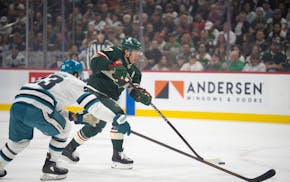Game 2 of the Western Conference finals raised a question both hypothetical and philosophical: Can the Timberwolves win their first NBA championship if their best player shoots like he's wearing mittens?
Anthony Edwards is the Timberwolves' rising star, and one of the world's best young players. Friday night at Target Center, he continued a three-game trend of denting rims and concussing backboards, making just five of his 17 attempts from the field in the Timberwolves' 109-108 loss to Dallas.
At the moment, Edwards is a more effective spokesman for winter gear than his new basketball shoes.
"He's got to pick up his decisionmaking," Timberwolves coach Chris Finch said.
In Game 7 of the conference semifinals at Denver, Edwards made six of 24 shots, yet the Wolves defeated the defending champion Nuggets.
In Game 1 of the conference finals, Edwards made six of 16 shots, one reason the Wolves lost a close game.
In Game 2, the smart money would have been on him resuscitating his offensive game.
Instead, Edwards continued to shoot and react poorly. In his past three games, he's shooting a tick under 30 percent.
He again looked fatigued, although he said after the game that he felt fine. He finished with 21 points, largely because he made nine of his 10 free throws. He also contributed five rebounds, seven assists and a block.
Edwards committed two turnovers, both in the second half, and finished a team-worst minus-9.
"They just show me crowds, man," he said. "They're sending the gaps. But I'm turning down a lot of shots. My midranges and stuff, I'm turning a lot of those down. But we're getting open looks, so I ain't tripping."
In the NBA, defense matters, as the Wolves proved this season. Passing, ballhandling, coaching, teamwork … it all matters.
Nothing matters more than making shots.
That's why players call it a "make or miss league."
The past three games, Edwards couldn't hit Lake Superior with a walleye.
In Game 7 at Denver, he made enough plays, offensively and defensively, to compensate for a bad shooting night.
In Game 1 against Dallas, he looked exhausted, and admitted that was the case.
In Game 2, whether he was fatigued or not, he missed shots and had trouble deciphering the Mavericks defense.
The Wolves need him to climb into a hyperbaric chamber or a time machine before Sunday night's Game 3 in Dallas.
"He's got to get more in transition," Finch said. "He's got to get out [and run]. ... I thought he started the game with a great burst, was really going downhill well. That really phased out as the game went along.
"He went in there a few times. I thought he could do it more. I thought he turned down some open looks, too."
Expecting a 22-year-old experiencing his first deep playoff run to manage pressure and energy conservation like a veteran might be unfair, but that is what the Wolves require if they are to make this the most successful season in franchise history.
Edwards has spent the past three games arguing that he should get more foul calls, but often doing so while play continues at the other end of the court.
He might be right about the way he is officiated, but his arguments are hurting his team, and Kyrie Irving's quickness and defensive intensity are obviously bothering him.
The Wolves have two offensive stars in their starting lineup — Edwards and Karl-Anthony Towns. In the fourth quarter, Edwards struggled and Towns played just three minutes, as the coaching staff decided to play Naz Reid over Towns.
As the game ended, Luka Doncic, who hit the winning three-pointer, screamed in the direction of the Wolves bench as Edwards walked by, head down.
Edwards peeked back, then put his head back down and walked toward the tunnel. He said he sees a light at the end.
"I feel like if we come out in Game 3 and try to minimize the gameplan mistakes," he said, "I think we'll win that game."
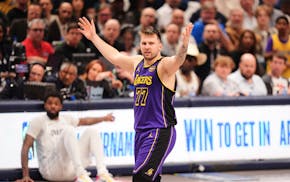
Souhan: Ant as the new Moss? Nope. The Lakers have that player
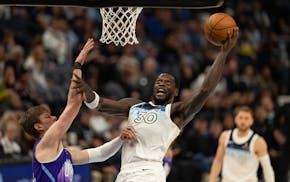
Souhan: It's time to stop complaining about Wolves' Randle
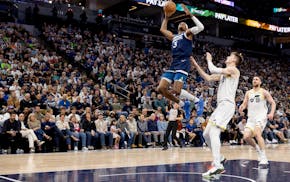
Souhan: Why this season's Wolves might be a better playoff team than last season's
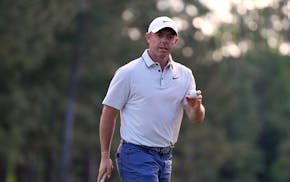
Souhan: McIlroy sets up his own Masters stress test, with DeChambeau serving as stressor
